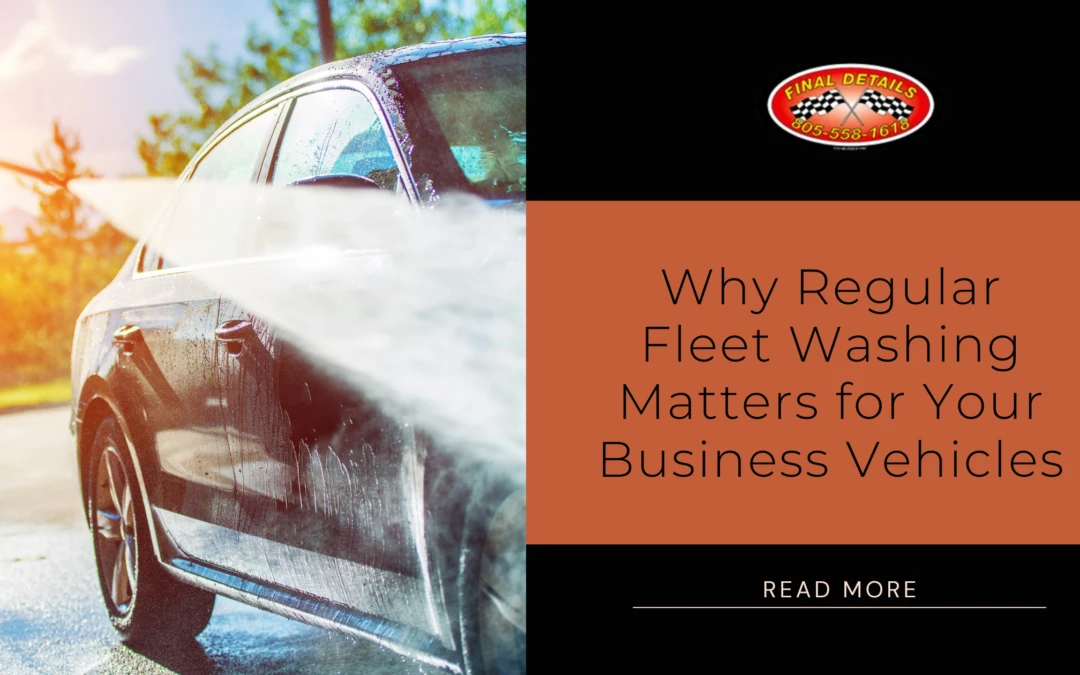- Regular fleet washing preserves vehicle condition by removing harmful contaminants, protecting paint, and preventing corrosion that leads to expensive repairs or reduced resale value.
- Consistent cleaning enhances safety by improving visibility, maintaining compliance with industry standards, and supporting proactive vehicle maintenance for operational reliability.
- Final Details LLC supports businesses with professional fleet washing services that maintain vehicle value, promote brand consistency, and demonstrate a commitment to quality standards.
When your fleet vehicles are on the road, they become more than transport tools. They are moving representatives of your brand, communicating professionalism, attention to detail, and reliability with every mile. Clean vehicles don’t just look appealing—they underscore your commitment to quality service. Beyond aesthetics, routine fleet washing carries a host of essential business benefits that go deeper than the surface.
This blog explores why consistent fleet cleaning should be an operational priority for any business that relies on vehicles. From preserving vehicle condition to enhancing customer perception and protecting long-term value, there’s far more at stake than simply washing away dirt.
First Impressions That Last
Your fleet vehicles are often the first contact point customers or the public have with your business. Whether it’s a delivery van pulling into a client’s driveway or a service truck parked at a job site, appearances matter. Dirty, stained, or neglected vehicles can project a careless attitude, even if your service quality is excellent.
Customers often equate cleanliness with trustworthiness. A sparkling vehicle indicates you take your business seriously and, by extension, that you’ll care about your customers’ needs. A poorly maintained exterior, in contrast, can raise doubts before a word is spoken.
Moreover, fleet branding like logos, contact information, and slogans may not work effectively if it’s hidden under road grime or mud. Clean surfaces mean your advertising stays visible, clear, and effective.
Protection Against Corrosion and Damage
Fleet vehicles encounter harsh conditions on the road: salt in winter, industrial pollution, insects, tar, and general grime. Left alone, these contaminants do more than make a vehicle look unprofessional—they actively damage the exterior.
Salt and road chemicals can accelerate corrosion on undercarriages and body panels. Acidic residues from insects or bird droppings can etch paint. Over time, these corrosive effects compromise the structural integrity of the vehicle’s body and even hidden components.
Routine washing isn’t about vanity; it’s a preventative measure. Removing these harmful substances regularly reduces rust risk and extends the lifespan of your fleet’s paint and metalwork. That protection lowers long-term maintenance costs, too. Repainting, rust repair, or even premature vehicle replacement are significant expenses that can be mitigated with consistent cleaning.
Optimized Resale and Trade-In Value
For many businesses, fleet vehicles represent a substantial capital investment. Eventually, these vehicles will be sold or traded in. Their condition at that moment directly affects the return you receive.
Buyers or dealers evaluate vehicles with a critical eye. Stains, rust, or faded paint signal neglect and raise red flags about potential hidden issues. Even minor cosmetic flaws can reduce perceived value. A clean, well-maintained exterior demonstrates that you cared for the vehicle throughout its service life.
Regular washing preserves paint and finish, protecting the fleet’s overall resale profile. It’s an investment in future value, making it easier to negotiate higher resale prices or secure better trade-in terms.
Safety and Compliance Considerations
Clean vehicles support safety in subtle but critical ways. Headlights, taillights, mirrors, and windows covered in dirt reduce visibility for drivers, increasing accident risk. Reflective markings or safety decals can become obscured, limiting their effectiveness at night or in poor weather.
Certain industries have regulatory standards for vehicle cleanliness. Food transport, waste hauling, or hazardous materials may require periodic cleaning to meet health, safety, or environmental guidelines. Failure to comply can result in fines or operational restrictions.
By adopting regular fleet washing, businesses maintain clear sightlines, maximize safety features, and ensure they meet industry standards. It’s an operational practice with real safety and compliance implications.
Fuel Efficiency and Performance Benefits
Aerodynamics may seem like a concern reserved for race cars, but dirt buildup affects fleet vehicles, too. Layers of grime can create minor drag or reduce airflow around vehicle surfaces. While the effect might seem trivial on a single trip, across hundreds or thousands of miles, even slight aerodynamic penalties reduce fuel efficiency.
Clean vehicles also tend to perform better in maintenance inspections. Dirt can hide leaks or damage until they become serious issues. Regular washing reveals underlying problems earlier, supporting proactive maintenance rather than reactive repairs.
It’s easy to underestimate how cleanliness affects operational costs. Yet when fuel savings, reduced wear, and early problem detection are combined, the financial argument for routine washing grows even stronger.
Enhanced Employee Pride and Accountability
Your fleet represents your company’s image not only to customers but to your team. Employees who drive or operate clean, well-maintained vehicles often feel greater pride in their work. A clean fleet signals that management cares about quality and expects the same from staff.
When drivers see that cleanliness is a priority, they’re more likely to treat vehicles respectfully, report issues promptly, and take care in their operation. That cultural effect fosters accountability across the team.
Conversely, sending employees out in dirty, poorly maintained vehicles can erode morale. It signals that management cuts corners or lacks attention to detail. Over time, that attitude can seep into other aspects of the business, harming quality standards and employee satisfaction.
Environmental Responsibility and Best Practices
Professional fleet washing services often use eco-friendly soaps, water recycling systems, and containment methods to prevent runoff from entering storm drains untreated. By choosing reputable providers or adopting these methods in-house, businesses demonstrate environmental responsibility.
Uncontrolled, DIY vehicle washing on pavement can send oil, grime, and chemicals into waterways. Municipalities increasingly regulate these practices to protect local water quality. Regular, compliant fleet washing can help businesses avoid fines or restrictions related to water pollution.
Clean fleets support a greener reputation, which resonates with environmentally conscious clients and partners. It’s another dimension where operational practices can reflect broader company values.

Consistency Beats Occasional Overhauls
Businesses sometimes view vehicle cleaning as an occasional task, a big wash before inspections or major events. While that might remove visible dirt temporarily, it misses the core benefit of routine, scheduled cleaning.
Contaminants do their damage over time. Rust starts in hidden crevices, paint fades slowly, and residues build up gradually. Intermittent cleaning allows these effects to accumulate between washes. By contrast, a consistent schedule interrupts that process, limiting corrosion and damage before it becomes serious.
Moreover, regular cleaning is more cost-effective. Removing fresh grime takes less time and labor than scrubbing away months of buildup. Fleet washing services often offer better pricing for scheduled maintenance programs, recognizing that maintenance washes are easier to manage.
For businesses aiming to maximize vehicle lifespan and maintain a professional image, consistent, scheduled cleaning delivers the most value.
Tailoring Fleet Washing to Your Needs
Fleet washing isn’t a one-size-fits-all service. The frequency, methods, and level of detail required depend on several factors:
- Industry and Usage: Delivery vehicles in urban settings accumulate different grime than construction trucks on unpaved sites.
- Local Climate: Salted winter roads, heavy rains, or dusty conditions all create unique challenges.
A professional provider can help assess your fleet’s needs and develop a cleaning schedule that balances cost and effectiveness. Options range from exterior-only washes to full detailing, including interior cleaning where needed.
For some companies, in-house washing facilities make sense; others benefit from mobile or on-site services that handle cleaning without disrupting operations. The key is recognizing that regular cleaning is a strategic choice, tailored to your fleet’s specific operational context.
Budgeting for Long-Term Savings
One objection businesses raise about fleet washing is the perceived added cost. Yet this view often overlooks the savings and value preservation that regular cleaning delivers.
Rust repairs, repainting, regulatory fines, lost resale value, and safety incidents; these are all costly consequences of neglect. Budgeting for regular washing is a form of preventive maintenance, much like routine oil changes or tire rotations.
Businesses that plan for these costs in their operational budgets avoid surprise expenses down the road. Moreover, by building washing into routine schedules, they avoid operational downtime or disruptions that can arise from unexpected repairs or compliance failures.
Fleet managers and business owners who view cleaning as a strategic investment typically see improved vehicle lifespans, lower overall maintenance costs, and stronger financial outcomes over time.
Supporting Your Brand with Consistency
Branding is more than logos or slogans. It’s about building trust through consistent quality in every interaction. Clean, well-maintained fleet vehicles are a visible part of that consistency.
When customers see the same company vehicle every week, always clean, always professional, it reinforces brand reliability. It says you care about details, follow through on commitments, and respect your clients.
For businesses competing in crowded markets, these subtle signals help differentiate their service. A neglected, dirty fleet tells a very different story and can undermine marketing investments that try to communicate quality and professionalism.
Strategic Partnerships for Fleet Washing
Many businesses turn to professional fleet washing providers to maintain consistent quality while freeing staff for core work. These partners often bring specialized equipment, trained staff, and environmentally responsible practices.
Mobile fleet washing services can clean vehicles onsite during off-hours, minimizing operational disruption. This approach supports consistency while reducing the burden on internal teams.
For companies with large or diverse fleets, working with a partner can ensure that all vehicles receive appropriate cleaning, regardless of location or usage type. It’s a strategic choice that aligns with broader goals of quality, efficiency, and professionalism.
A Reflection of Company Values
Ultimately, fleet cleanliness is more than a maintenance task. It’s a reflection of how a business sees itself and wants to be seen by others.
Companies that invest in regular washing communicate that they value quality, safety, and responsibility. They demonstrate that they care for their assets, respect their employees, and deliver on promises made to customers.
That commitment builds trust over time. It supports stronger customer relationships, better employee morale, and a competitive edge in markets where professionalism matters.
Conclusion: An Operational Priority Worth Making
Regular fleet washing is easy to overlook in the rush of business operations. Yet its impacts are real and wide-ranging, from reduced maintenance costs to stronger branding and safety outcomes.
Businesses that adopt a strategic, consistent approach to fleet cleaning see long-term benefits that far outweigh the upfront costs. They protect their investments, impress their customers, and support a culture of quality throughout the organization.
In the end, fleet washing isn’t simply a service. It’s a commitment to the standards your business upholds every mile of the journey.
Keep your fleet reflecting the values you stand for. At Final Details LLC, we prioritize regular cleaning to support safety, maintain value, and build trust with those who see your vehicles on the road. Choose consistent care that protects your business investment. Contact us today.

